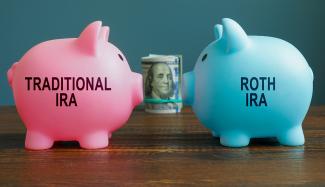
Is a Roth conversion right for me?
Does it make sense to pay taxes on my retirement accounts today rather than wait until later in retirement? It depends. If you are, like me, seeing a lot of ads about Roth conversions then this article may be helpful. What is a Roth conversion and what are its benefits and disadvantages? A Roth conversion is a transfer or rollover of the assets in a Traditional IRA (including SIMPLE and SEP) or qualified employer sponsored retirement plan (such as a 401K, 403B and governmental 457) to a Roth version of the originating account. The conversion is treated as a taxable distribution as you are deemed to have received a payment (or distribution) of the money going into the new Roth account. You can convert all assets at once or choose a systemic Roth conversion plan by which you will carry out multiple conversions over several years thus limiting the immediate tax impact. A full conversion is the quickest way to get a significant sum into a Roth account as you are not limited by a maximum annual contribution limit or eligibility based on your modified adjusted gross income. Many investors view a Roth conversion strategy as insurance against future tax increases that could otherwise hit withdrawals from their tax-deferred retirement savings. This insurance does, however, come with a cost – the taxes now due on the taxable withdrawal (conversion).
Roth accounts are funded by after-tax contributions which are not deductible. Contributed assets to Roth accounts grow tax free until withdrawal. Roth accounts have two big tax advantages: tax-free withdrawals and no required minimum distributions (RMDs) after reaching age 73. With a Roth account you can continue to invest past your RMD age and are never required to take a withdrawal. A Roth conversion might be a good idea if you fit one of these scenarios: (1) If you believe that your effective tax rate (tax bracket) will be higher in retirement than the rate at which your income is currently taxed. Reasons in support of this scenario include you have a “big pay-day ahead” or you believe that US Federal tax rates will rise significantly in the future. (2) High net worth individuals, with a large balance (of money that is not needed in their lifetime), may view a Roth conversion as a means to reduce their gross estate (by paying the tax on conversion) and leave their heirs an inheritance that could grow tax-free for years. (3) If your retirement savings are not diversified by tax treatment, for example taxable, tax-deferred and Roth. (4) You have irregular income streams and lower than usual personal income this year.
There are several reasons why a Roth conversion might be wrong for you. Not having ample savings to cover the tax bill resulting from a conversion or the expectation that your tax bracket will be lower in future years are both good reasons to avoid a conversion. If your IRA is your primary source of income for living expenses, then a conversion might also be a poor choice. Beware of the 5-year rule – for tax and penalty free withdrawals of earnings, you must wait 5 years from the beginning of the conversion year and be 59.5 years old. A large conversion can also trigger higher Medicare premiums (Part B and D) and result in your Social Security benefits being taxed. If you plan to leave your IRA to charity upon your death, it does not make sense to convert the assets, pay the taxes due and then leave the Roth IRA (with less money) to a charity. Take your time. Do not rush into a Roth conversion, for once converted the transaction cannot be recharacterized or undone.

